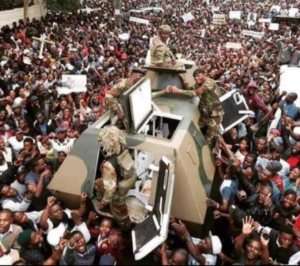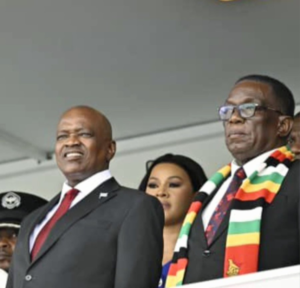MNANGAGWA’S SECRET PLAN TO STAY IN POWER EXPOSED
President Emmerson Mnangagwa has publicly denied wanting to extend his constitutional term limit beyond 2028. However, behind the scenes, things are very different. His political allies and supporters are not hiding the fact that there is a strong campaign underway for Mnangagwa to stay in power beyond his second term, extending his presidency to 2030. This campaign seems well-organized and unstoppable, and it’s clear that Mnangagwa is aware of it and approves.
This situation shows Mnangagwa’s politics of deceit and secret ambition to hold onto power, no matter what. By publicly denying his intention to stay on, he creates a way to deny responsibility if things do not go as planned. The problem is, Vice-President Constantino Chiwenga and his supporters in Zanu PF, especially those with military backing, are not happy about Mnangagwa’s plan to stay in power beyond 2028. This situation has caused tension within the party, as different groups try to secure their power and future.
Mnangagwa’s denial of his plan to extend his term limit may sound convincing to some, but his political allies continue to reveal his true intentions. For instance, Midlands Provincial Affairs and Devolution Minister Owen “Mudha” Ncube, a close ally of Mnangagwa, has been caught on video supporting the campaign for Mnangagwa to stay in power longer. Just like Ncube, many of Mnangagwa’s closest allies are showing the real agenda behind the scenes, exposing his plan to extend his presidency.
This kind of political strategy is not new in Zimbabwe. Many leaders have used tactics like this to stay in power, even after their term limits have ended. They create a public image that shows them as following the law and respecting the constitution, but in private, they are working hard to remain in control. In Mnangagwa’s case, his public statements are simply meant to give him an excuse if his plan doesn’t work. By denying his intentions, he can say that the campaign for him to stay was done by his supporters and not by him.
The problem with this strategy is that it could lead to more problems within Zanu PF. The tension between Mnangagwa and Chiwenga is growing, and it may result in a serious power struggle. Chiwenga has strong support within the military, and he may not allow Mnangagwa to extend his time in office without a fight. If this conflict continues, it could weaken Zanu PF and create more instability in the country.
At the same time, Mnangagwa’s supporters are pushing hard for him to stay. They believe that he is the only one who can keep Zimbabwe stable and moving forward. They see Chiwenga as a threat to their power and interests. This is why they are willing to campaign for Mnangagwa to stay beyond 2028, even though the constitution does not allow it. By doing so, they hope to protect their own positions and influence.
In the end, Mnangagwa’s plan to stay in power beyond his second term will likely cause more division and conflict within the government and the ruling party. The campaign to extend his term limit shows the reality of Zimbabwean politics: it is not always about following the constitution or what is best for the country. Instead, it is often about individuals and groups trying to hold onto power for as long as possible, even if it means breaking the rules or going against the will of the people.
The coming years will show whether Mnangagwa’s plan will succeed or if the tension within Zanu PF will lead to a different outcome. One thing is clear, though: his public denial of wanting to extend his term is only part of the game. Behind the scenes, his real goal is to stay in power beyond 2028, and his allies are working hard to make that happen. The question now is whether Zimbabweans will accept this, or if there will be a pushback against yet another attempt to hold onto power beyond what the constitution allows.



